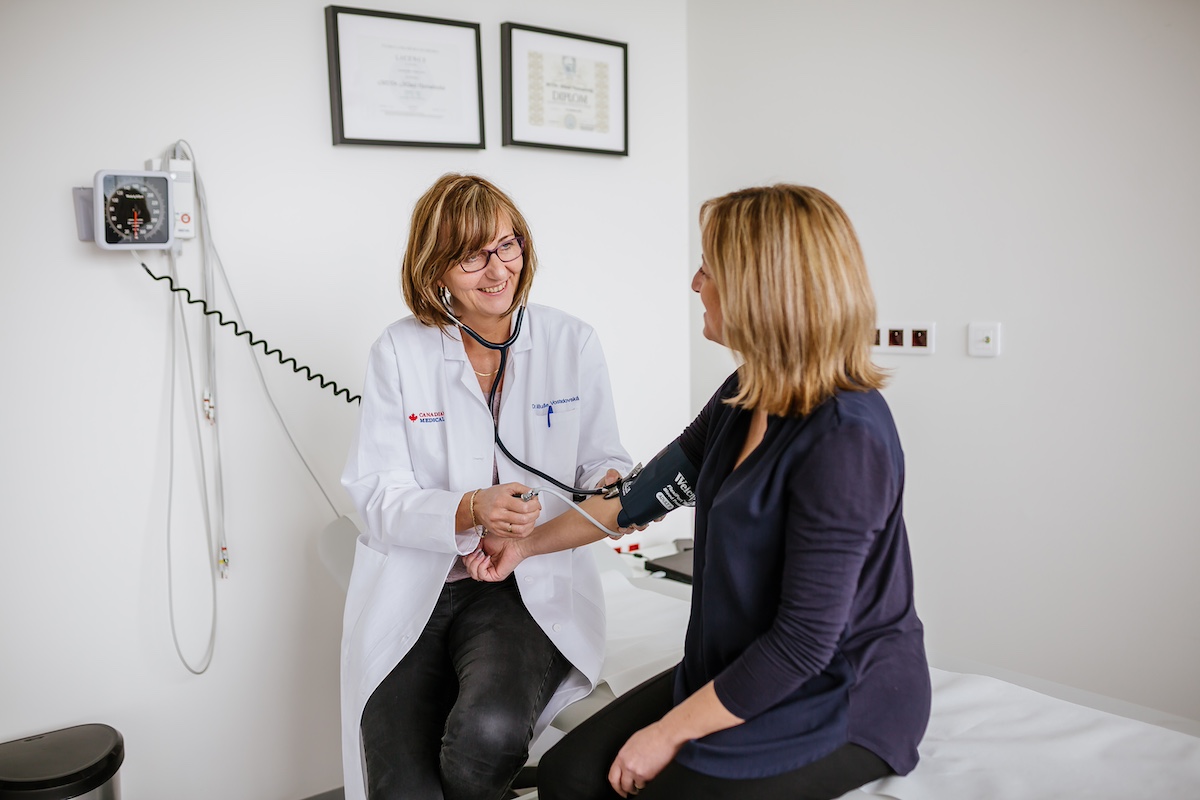“Obesity, poor lifestyle, and stress – avoid these and you’ll also avoid chronic illness”

Canadian Medical / Waltrovka, Prague 5
Text: Martina Hošková, M.Zisso; Photo: Archive
“The Czech population is facing a number of chronic diseases, the cause of which, in addition to heredity or age, is mainly poor lifestyle and obesity. That’s why I put prevention first, and recommend regular preventive check-ups with your general practitioner,” explains Dr. Dalibor Stoszek, Head Physician at AFI Clinic. Every year, his clients undergo a much broader examination, which is the basis for possible diagnosis and subsequent specialized treatment. Digitization of patient information and its secure sharing among practitioners, specialists, and nurses not only within Canadian Medical clinics is extremely helpful in this continuous complex care.
Which chronic diseases are most commonly diagnosed in your practice?
Without relying on statistics, I am quite sure it is a trio of high blood pressure, high cholesterol levels, and diabetes. In this regard, we probably won’t differ from other facilities or practices. In our clinics specifically, we are also seeing an increasing incidence of mental health issues, particularly anxiety, depression, and sleep disorders. A large number of people also suffer from back pain.
Do we know the main causes of the most common chronic diseases?
The former, in addition to age and genetics, are clearly associated with poor lifestyle and obesity. The latter, along with generally higher societal stress, are influenced by the spectrum of our clients, who are often performance-oriented and under a lot of pressure. And back pain is a combination of both. To illustrate with an example, many clients come in with a “slipped disk”, but that’s just a marginal cause of their back pain. Most back problems result from faulty posture or working position.
What is the influence of genetic factors on the predisposition to chronic diseases, and how does it affect diagnosis and treatment?
The inquiry about the occurrence of monitored diseases (especially tumors, high blood pressure, cholesterol, cardiovascular diseases, and diabetes) is part of the initial examination conducted by a general practitioner, and is updated at each preventive check-up. Hereditary cancer diseases are relatively rare, accounting for about 5-10%. In women, it typically includes breast and gynecological tumors, and in both genders, colorectal tumors. In such cases, we recommend genetic testing at a specialized clinic, along with additional steps such as breast ultrasound or stool examination for hidden bleeding, or even preventive colonoscopy at a younger age than recommended for the non-risk population. Strong genetic predisposition is also observed in type 2 diabetes, which typically develops at an older age and is associated with obesity. If we have this information, we actively focus on addressing overweight or obesity. If both parents have diabetes, there is a high likelihood that you will have it too. However, the age at which it develops makes a significant difference, and that difference is influenced by lifestyle choices, particularly diet and weight management. In families with frequent early-onset cardiovascular events (heart attack or stroke), it is necessary to investigate inherited disorders of cholesterol metabolism.
Does it make sense to undergo genetic testing in case of a family burden?
As I mentioned above, patients suspected of cancer, especially breast, ovarian, and colon cancers, are referred to genetic counseling or oncology centers where genetic consultations are conducted. Individuals suspected of having genetically determined high cholesterol levels are referred to preventive cardiology centers or lipid centers for detailed analysis, and, if necessary, an examination of the extended family is recommended.
And what is your view on commercial genetic testing?
I would be cautious about extensive commercial genetic testing for otherwise healthy people. Everyone naturally faces some level of risk for certain diseases, we are not robots. Unfortunately, I have also had a patient who, based on a thick book of his risk analysis, kept demanding more and more tests, and basically lived in constant fear of some disease. It is simply a matter of setting a reasonable limit. This is primarily the role of the general practitioner, who knows the patient best.
What impact can lifestyle and dietary habits have on the development and progression of chronic diseases?
An absolutely crucial one. However, proper lifestyle management is a topic that would require several hours or books to fully describe, and I am afraid I am not capable of doing it justice here. Nevertheless, the most important thing is to find the courage to make changes in your lifestyle. My fellow practitioners are well educated in this area, and know where to refer the patient if necessary. Our team includes professionals such as a nutritionist and a psychologist, among others.

“At Canadian Medical, we offer annual check-ups to all clients.”
Can you describe how chronic diseases can influence each other, and how it affects the patient’s overall health?
I would like to take obesity as an example. This is by no means just a cosmetic problem, let alone an isolated one. Obesity leads to increased blood pressure, cholesterol, and diabetes. Each of these three diseases individually, and much less in combination (which is basically the rule), leads to an extreme risk of heart attack, stroke, or kidney failure. Obese people have joint and back problems that make it difficult to lose weight to some degree. Immunity declines, infections become more severe, recovery takes longer, and the consequences of conditions like COVID or the flu are more severe. The constant feel of illness leads to problems with mental health and sleep, which in itself is another independent risk factor for cardiovascular diseases. And that is “just” obesity. And given the obesity pandemic, we are facing an unimaginably serious problem.
What prevention and screening methods do you recommend for reducing the risk of the most common chronic diseases?
The basic recommendation is to attend preventive check-ups with your primary care physician. By law, they are recommended at two-year intervals, which should be sufficient in most cases. However, at Canadian Medical, we offer annual check-ups to all clients, because we prioritize preventive medicine. These check-ups include updating all the important information about the patient, the so-called medical history or anamnesis, as well as additional examinations according to age and risk factors. For example, blood tests for sugar and cholesterol levels, urine analysis, referral to mammography for women over 45, stool tests for hidden bleeding from the age of 50, and many others. The basic set of examinations is determined by law for everyone. Our clients undergo a much broader scope of examination so that we can gather as much information as possible while avoiding unnecessary burdens on the patient.
How do you deal with comorbidities in patients suffering from more than one chronic disease?
That is a daily bread for practitioners, and their most important role in patient care. As life expectancy increases, the number of these so-called polymorbid patients also goes up. All information should be gathered by the practitioner, sorted, put into context, and monitored, for example medications that should not be taken together. The Czech system is characterized by the fact that patients can visit as many specialists as they want without restriction or control. And since we don’t have digitized documentation, as a practitioner, I often have no idea about it.
What do you think the solution is?
At Canadian Medical, we have practitioners who avoid unnecessary referrals to specialists, but, more importantly, we share all data within one system. This significantly reduces the risk of adverse drug interactions and repeated examinations.
What are the current trends in the treatment of chronic diseases?
In treatment, for example, applications are used to monitor and evaluate certain bodily functions. There is a huge expectation for the rise of artificial intelligence, which is a topic that could fill an entire article. This question cannot be fully answered in one response, but as an example, I can mention smartwatches. There are a considerable number of patients we examine for what’s called palpitations, which are sensations of rapid or irregular heartbeat. The problem is that these sensations are often fleeting, lasting seconds or minutes, and by the time emergency services arrive or the patient is examined in the clinic, they are symptom-free, and their electrocardiogram (EKG) appears normal. Even 24-hour monitoring may not capture the moment of symptoms, leaving uncertainty about whether this is a rhythm disorder that requires treatment. Here, smartwatches with EKG monitoring can be of great service, as they can record the EKG waveform at the moment of symptoms with sufficient quality to evaluate the severity of the finding. Thus, they can help with proper treatment or (mostly) reassure the patient that it is a completely harmless sensation.
What about your devices and digitization? Do your patients have to go from doctor to doctor with a folder of printed medical records?
Canadian Medical has the vast majority of specialties in our clinics. All examinations conducted by our practitioners or specialists are shared in digital form, and are available to doctors and nurses for follow-up care. Most examinations conducted in surrounding facilities, such as university hospitals, are also available in our system. A huge advantage is our myCANADIAN application, where clients can browse their results, findings, medical reports, and also prescriptions.
How do you support patients in their efforts for self-control and self-management of their health while living with a chronic illness?
One of the great advantages of our doctors is the sufficient amount of time allocated to each patient. In most cases, we have the time to properly explain everything the patient needs to know about both treatment and prevention. We strive for an Anglo-Saxon approach to patient care. This means that the patient should receive maximum information from his doctor, have the opportunity to ask questions, actively participate in their treatment, and have the right to make informed decisions. Foreign clients are accustomed to and expect this approach, and undoubtedly, Czech clients appreciate it as well.
As part of your practice, you worked in the UK and Saudi Arabia. Are they very different worlds in terms of prevention and healthcare compared to the Czech Republic?
Saudi Arabia is a completely different world. On one hand, you have extremely wealthy patients who are cared for by the best specialists in the West, in facilities with no limits. On the other hand, there are people who don’t even have basic healthcare. Not to mention the workers from Bangladesh or the Philippines. The healthcare system in the United Kingdom has its fair share of problems, but the reason I went there to learn and work is the significantly different primary care provided in outpatient settings. In comparison to our system, English practitioners have unimaginably greater authority and fewer restrictions. However, they also have more responsibilities and must care for children, pregnant women, contraception, hormonal treatment, and so on.
Referring a patient to a specialist requires careful consideration and justification, ensuring that as a practitioner, you have done everything you could. Specialists are scarce and extremely expensive for the system. That’s why the demands on British practitioners are very high, and many competencies (which Czech practitioners may not even think about) are transferred to nurses.
Working in healthcare is generally demanding. How do you relax, and what do you like to do in your free time?
It may sound cliché, but my family is my biggest anchor. I have a seven-year-old daughter, and since I am away from home four days a week, I try to spend as much of my remaining time with her and my wife as possible.
In the winter, we spend a lot of time skiing, and in the summer, we enjoy the mountains together. And thanks to my fantastic wife, I can also travel and ride my motorcycle, which helps me clear my mind wonderfully.
 Dr. Dalibor Stoszek is a Head Physician at AFI Canadian Medical Clinic. He is an experienced doctor, with international experience and a diverse professional history. He graduated from the Faculty of Medicine at Palacký University in Olomouc and subsequently obtained certifications in internal medicine, emergency medicine, general practice, and family medicine in England. In addition to his work as a general practitioner, he also maintains a practice in emergency services. He has further developed his professional skills abroad, in Saudi Arabia and England, and through volunteer work in several sub-Saharan African countries. His work experience as a general practitioner in England has been most beneficial for his current career. The role of a general practitioner there encompasses all fields in great depth, and he strives to apply this concept at Canadian Medical as well.
Dr. Dalibor Stoszek is a Head Physician at AFI Canadian Medical Clinic. He is an experienced doctor, with international experience and a diverse professional history. He graduated from the Faculty of Medicine at Palacký University in Olomouc and subsequently obtained certifications in internal medicine, emergency medicine, general practice, and family medicine in England. In addition to his work as a general practitioner, he also maintains a practice in emergency services. He has further developed his professional skills abroad, in Saudi Arabia and England, and through volunteer work in several sub-Saharan African countries. His work experience as a general practitioner in England has been most beneficial for his current career. The role of a general practitioner there encompasses all fields in great depth, and he strives to apply this concept at Canadian Medical as well.

